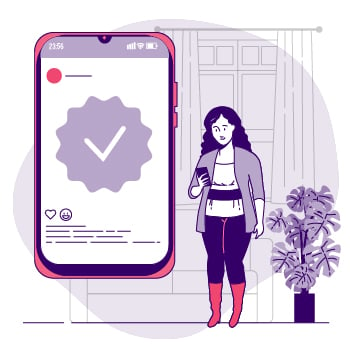Verify the Credentials of an Authorized Translator
If you’re working with an authorized translator, verifying their credentials is essential to ensure the best possible translation results. But how can you do that? The process may seem intimidating, but in this blog post, we’ll provide you with a step-by-step guide to help make verifying credentials easy. You’ll learn all about the different types of certificates an authorized translator may possess, and we’ll provide you with a checklist to ensure you have the correct information. With our helpful guide, you’ll be able to quickly and confidently verify the credentials of any authorized translator.
Why it’s Important to Verify a Translator’s Credentials
When it comes to translation, accuracy and quality are paramount. That’s why verifying a professional translator’s credentials is essential before entrusting them with your documents. A certified translation, whether an official document, legal paperwork, academic material, or any other content, requires expertise and knowledge of both the source and target language.
When seeking official translation services for documents like marriage certificates, especially for use in foreign countries, it’s crucial to verify a translator’s credentials, ensuring they are ATA-certified and capable of handling a range of industry-specific documents with a standard turnaround time, thereby guaranteeing accurate and reliable document translations.
By verifying a translator’s credentials, you can ensure they have the qualifications and experience to provide an accurate translation. Whether you’re working with an individual translator or a translation agency, conducting this verification process will give you peace of mind and confidence in the final result.
Verifying credentials becomes even more crucial when dealing with sensitive or confidential information, such as government documents or legal paperwork. Hiring a qualified translator with the necessary certifications can help guarantee confidentiality and professionalism throughout the translation process.
In a world where anyone can claim to be a translator, verifying credentials is a step towards ensuring the highest quality translation for your specific needs. So, don’t hesitate to thoroughly research and demonstrate a translator’s qualifications before proceeding. It will save you time, money, and potentially a lot of frustration down the line.
To ensure the accuracy and legitimacy of personal documents such as birth certificates and medical records in legal proceedings or official purposes, it is crucial to engage experienced translators with proper translation certification, as certified translations play a pivotal role in the translation industry and meet the specific translation requirements. A reliable Translation Company can provide human translation services, ensuring precision in translating common documents for official use, highlighting the significance of verifying a translator’s credentials, especially in the type of translation related to personal and sensitive information.


Researching the Agency or Individual Translator
When researching a translation agency or individual translator for legal purposes, it is essential to prioritize those who possess translator certification and specialize in language professionals. This ensures accurate translations of documents such as vital records, police reports, and medical reports, accompanied by certificates of accuracy.
Moreover, attention to quick turnaround times is crucial. This emphasizes the importance of avoiding reliance on machine translation when dealing with sensitive materials like death certificates and instead opting for a qualified translation team with expertise in maintaining precision and confidentiality.
When verifying an authorized translator’s credentials, one crucial step is researching the agency or individual translator you plan to work with. This research will help you understand their reputation, expertise, and reliability.
Explore their website or online presence to learn more about their background, services, and experience. Look for relevant information demonstrating their specialization in your field or language pair. A professional translation service should have a clear and informative website that showcases their qualifications and expertise.
Additionally, consider checking if the translator or agency is affiliated with any translation-related professional associations or organizations. These affiliations can indicate a commitment to high standards and continuous professional development.
It’s also worth exploring online reviews or testimonials from previous clients. This feedback can give you a sense of their work quality and customer satisfaction. If possible, reach out to individuals or businesses who have worked with the translator or agency before to inquire about their experience and the accuracy of their translations.
Finally, if you require an official translation, such as a legal or academic document, verify if the translator or agency works with a notary public or has the necessary certifications for handling such papers. This will ensure that the translation meets the specific requirements of the relevant government agency or institution.
By thoroughly researching the agency or individual translator, you can gain valuable insights and decide who to trust with your translation needs. This step is crucial in ensuring you receive a high-quality, accurate, and reliable translation that meets your requirements.
Read more about an authorized translator for legal documents.
Checking Accreditation and Certifications
When verifying an authorized translator’s credentials, checking their accreditation and certifications is crucial. This ensures they have the qualifications and expertise to provide accurate translations.
Start by reviewing the translator’s educational background and certifications. Look for any specialized training or coursework in translation or language studies. Additionally, check if they hold any specific credentials for translators, such as the ATA (American Translators Association) certification. This certification is highly regarded and indicates a high level of proficiency in both the source and target languages.
Another important aspect is their experience with legal documents or specific fields. For example, ensure the translator knows legal terminology and procedures if you need a legal document translated. Look for certifications or affiliations related to legal translation, such as a certification for legal translation.
Lastly, consider their fluency in the source language. Fluency is crucial for accurate translation, as it ensures that the translator understands the nuances and complexities of the original document. If you’re working with a translator for a specific foreign language, ensure they have a strong command of that language.
By thoroughly checking the translator’s accreditation and certifications, you can have confidence in their abilities and trust that they will provide accurate translations that meet your needs. Don’t hesitate to ask for proof of accreditation or certifications before proceeding with the translation process.


Verifying References and Previous Work
Verifying references and previous work is crucial in ascertaining an authorized translator’s credentials. It allows you to understand better the translator’s work quality, reliability, and professionalism.
Start by requesting references from the translator or agency. This could be in the form of testimonials or contact information for previous clients. Reach out to these references and inquire about their experience working with the translator. Ask about the accuracy of the translations, the timeliness of delivery, and overall satisfaction with the services provided.
Additionally, ask the translator for samples of their previous work. This will give you a firsthand look at their translation style, attention to detail, and ability to handle complex subject matters. Look for samples similar to the type of content you need to translate. This will give you an idea of the translator’s expertise in your field or industry.
By verifying references and reviewing previous work, you can ensure that the translator has a track record of delivering high-quality translations and meeting client expectations. Building trust and confidence in the translator’s abilities is essential before proceeding with your translation project.
Requesting Samples and a Test Translation
Once you have researched the agency or individual translator, checked their accreditation and certifications, and verified their references and previous work, the next step in ascertaining their credentials is to request samples and a test translation. This will allow you to assess their translation style, attention to detail, and ability to translate content in your specific field or industry accurately.
When requesting samples, ask the translator or agency for examples of their previous work similar to the content you need to translate. This will give you a better understanding of their expertise and proficiency in handling the subject matter.
In addition to samples, consider requesting a test translation. This involves providing the translator with a small portion of the content you need to be translated and asking them to complete a sample translation. This will give you firsthand experience of their translation quality, accuracy, and ability to meet deadlines. It’s an opportunity to assess their understanding of the source language, attention to detail, and overall translation skills.
By requesting samples and a test translation, you can make a more informed decision about the translator’s capabilities and suitability for your project. Ensuring you receive high-quality translations that meet your specific requirements and expectations is essential.
Confirming Rates and Payment Methods
When confirming rates and payment methods for certified translations, it is essential to consider the lowest rates offered by translation providers while assessing their acceptance rate and ensuring compliance with legal requirements. Reliable services provide transparent information about the cost of translating official certificates, financial statements, and documents and guarantee an outstanding service that meets your needs within the stipulated delivery timeframe. Additionally, inquire about the type of certification provided, ensuring accuracy in preserving the integrity of source material, regardless of the original language.
When confirming rates and payment methods with an authorized translator, it’s essential to understand their pricing structure and payment policies clearly. Discuss rates with the translator or agency to ensure they align with your budget and expectations. Some translators charge per word, while others may charge per hour or have a fixed fee for certain types of documents. Clarify if there are any additional fees for rush translations or revisions.
Once you’ve agreed upon the rates, discussing the payment methods accepted by the translator or agency is essential. Most translators will accept bank transfers or PayPal payments, but confirming this information is always a good idea. Inquire about their payment terms, such as whether they require a deposit upfront or if full payment is due upon completion of the translation.
It’s also worth discussing potential discounts or packages for bulk translations or long-term projects. Some translators may offer special rates for ongoing collaborations or volume discounts for large amounts of content.
By confirming rates and payment methods in advance, you can avoid misunderstandings or surprises when it comes time to pay for the translation services. This open and transparent communication will help establish a trusting and professional relationship with the translator or agency, ensuring a smooth and successful translation process.
Final Thoughts and Takeaways.
As we wrap up this guide on verifying the credentials of an authorized translator, it’s clear that taking the time to research and confirm a translator’s qualifications is essential for ensuring accurate and high-quality translations. Following the step-by-step process outlined in this blog post, you can approach the task with confidence and peace of mind.
Accuracy and quality are essential in translation, especially for sensitive or confidential documents. By verifying a translator’s credentials, you can be assured that they have the necessary expertise and experience to handle your needs.
Additionally, don’t overlook the importance of checking the translator’s references and previous work. This will provide valuable insights into their work quality, reliability, and professionalism. Requesting samples and a test translation will further help you assess their abilities and ensure they align with your expectations.
Lastly, when discussing rates and payment methods, clear communication is crucial. Ensure you thoroughly understand the pricing structure and payment policies to avoid surprises or misunderstandings.
In conclusion, verifying the credentials of an authorized translator may require some effort, but it’s well worth it for the peace of mind and quality assurance it provides. So, take the time to research, check accreditation, verify references, request samples, and confirm rates. With these steps, you can confidently select a translator who delivers accurate and reliable translations tailored to your needs.
Expert Translation Services Ensure Accuracy and Trust
A reputable translation company offers official translation services for a wide range of documents, ensuring accuracy and reliability for their clients. Whether you need academic transcripts translated for educational purposes or legal documents for official proceedings, these companies employ skilled translators who specialize in various fields. Their expertise guarantees that every translated document meets the stringent requirements of institutions and authorities, maintaining the integrity and authenticity of the original content. By providing precise and culturally appropriate translations, these companies facilitate smooth communication and compliance across different languages and regions.
When translating a source document, an ATA-certified translator plays a crucial role in overcoming language barriers and ensuring the translation’s quality and accuracy. Their certification status, granted by the American Translators Association, attests to their proficiency and adherence to professional standards. This certification reassures clients that their translations will be handled by experts who can navigate the complexities of language and cultural nuances. Whether it’s a legal contract, medical record, or technical manual, an ATA-certified translator provides the reliability and precision necessary to maintain the integrity of the original document, facilitating clear and effective communication across different languages.
Frequently Asked Questions
What is the importance of verifying a translator's credentials?
Verifying a translator’s credentials ensures the quality and accuracy of translation services and helps maintain the integrity of important documents and communication.
How do I start verifying a translator's credentials?
Begin by requesting the translator’s certification or accreditation documents.
What should I look for in a translator's certification documents?
Check for the translator’s name, language pairs they are certified in, and the issuing authority’s details.
Can I verify a translator's credentials online?
Yes, many translator certification bodies have online databases where you can verify credentials by entering the translator’s name or certification number.
What if the translator is not certified?
Non-certified translators may still be highly skilled. In this case, ask for references or samples of their work.